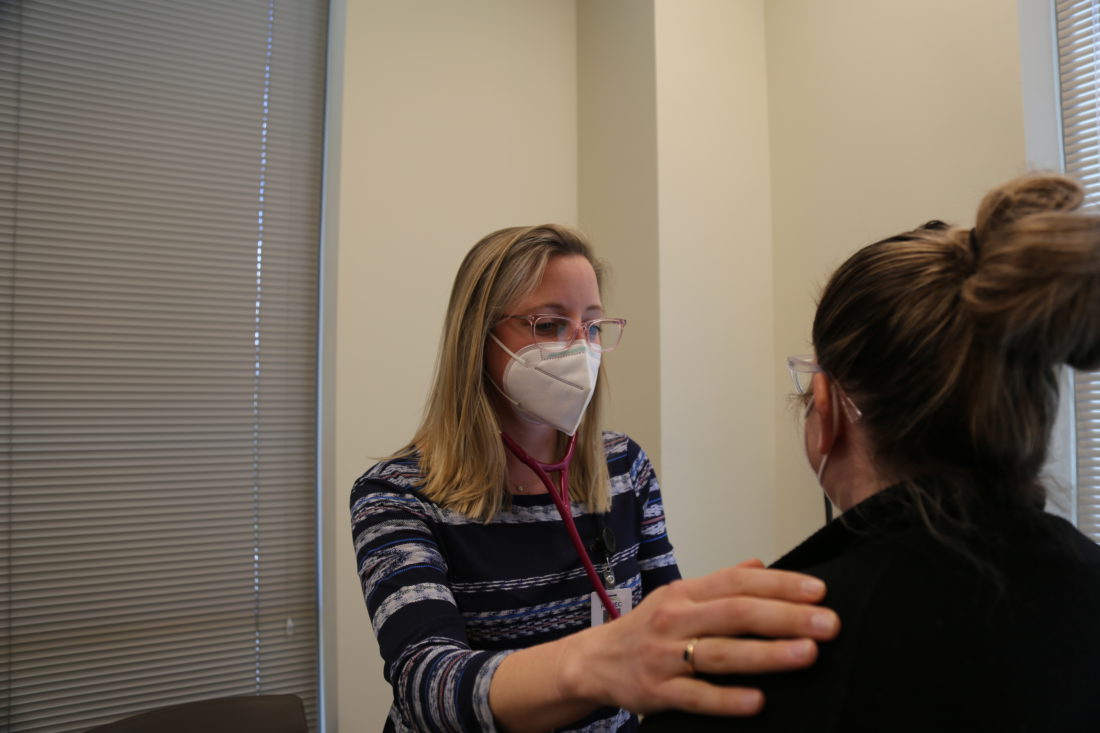MAHEC sees uptick in antibody infusion treatments
The Asheville-based Mountain Area Health Education Center has experienced an increase in patients receiving antibody infusion treatments — the antibody cocktail called REGEN-COV — in recent weeks.
During the week of July 19, the center’s infusion team served 21 people, says Keelan Dorn, a family medicine nurse practitioner at MAHEC. From January through April, she estimates that the health center performed 10-20 infusions per week, but only five infusions took place during all of June.
REGEN-COV is a combination of the monoclonal antibodies casirivimab and imdevimab designed to target the coronavirus and lower the risk of severe COVID-19 symptoms. As with other monoclonal antibodies, the U.S. Food and Drug Administration has not formally approved REGEN-COV but has issued an emergency use authorization for eligible patients.
MAHEC had initially offered infusions of bamlanivimab, a different monoclonal antibody produced by Eli Lilly and Co. Dorn says the center switched to REGEN-COV, produced by Regeneron, in early July due to the medication’s greater effectiveness against the more transmissible delta coronavirus variant, which is predominant in North Carolina.
Unlike previous treatments, REGEN-COV can be used on people with asthma or high blood pressure over the age of 12 and people with a body mass index of over 25. “The criteria for infusion has changed, so we’re able to reach a broader patient base,” says Dorn.
The medication can prevent a mild case of the virus from becoming worse, Dorn continues. In a phase 3 outcomes trial, REGEN-COV reduced the risk of hospitalization in patients with mild to moderate COVID-19 symptoms by 70% and reduced the risk of death in that same group by 71% compared to a placebo, according to a March press release from Regeneron.
To be eligible for REGEN-COV treatment, patients must have been exposed to the coronavirus within the past 10 days; MAHEC recommends infusions be received as early in the illness as possible. “Usually during days six through 10 [of COVID-19], historically, the symptoms get a little worse,” Dorn explains. “If we can catch it early and get patients infused earlier, there are generally better outcomes.”
For a patient to receive REGEN-COV, a referring physician should fax the referral form located at www.MAHEC.net/infusion with a copy of a positive COVID-19 test to 828-407-2218. Under the federal CARES Act, the government is covering the cost of antibody infusions, and the medication is free for all regardless of insurance coverage. Dorn says the intravenous infusion, which is given in a tent on the MAHEC Biltmore campus, takes 20 minutes. Patients are monitored for one hour for side effects and then released.
AdventHealth Hendersonville, which previously provided REGEN-COV in its emergency department, has since partnered with MAHEC to provide the treatment at its specially-designed facility, says spokesperson Victoria Dunkle. REGEN-COV is also offered at Harris Regional Hospital in Sylva, says CEO Steve Heatherly. Health care providers can call in a referral at 828-586-7988.
Pardee Hospital in Hendersonville is administering REGEN-COV in its emergency department, says Greg McCarty, department medical director. Providers can call 828-696-4270 to discuss eligibility for transfusions.
For more information about REGEN-COV treatment at MAHEC, call 828-589-9750.
NCDHHS expands COVID-19 wastewater monitoring
The N.C. Department of Health and Human Services announced an expansion of its COVID-19 wastewater monitoring program on July 22. The expansion increased the number of wastewater treatment plants across the state where samples are tested for the coronavirus from 10 to 19.
Among the newly added monitoring sites is the Buncombe County Metropolitan Sewerage District wastewater treatment plant in Woodfin, interim NCDHHS spokesperson Amy Dominello Braun told Xpress.
The monitoring program seeks to identify trends and locate areas where COVID-19 is spreading. These samples are tested for viral particles, which are shed through the stool of infected people.
NCDHHS and University of North Carolina researchers began testing wastewater in January as part of a larger surveillance program by the N.C. Wastewater Monitoring Network. Findings from the state COVID-19 wastewater monitoring program can be found at avl.mx/a2l.
Unvaccinated drive Buncombe COVID spread
About 92% of new COVID-19 cases in Buncombe County are among people who are unvaccinated, said Stacie Saunders, the county’s public health director, on July 21.
As of July 29, according to NCDHHS data, 52% of Buncombe County’s population is fully vaccinated, and 55% of the population is partially vaccinated. The county’s COVID-19 test positivity rate was 6.6%, up from less than 2% several weeks ago.
On the same date, North Carolina had a 9.3% test positivity rate and recorded 3,268 new cases of COVID-19 as reported by NCDHHS.
Vaccination options
- Buncombe County Health and Human Services administers the COVID-19 vaccine at Buncombe County Health Department, 40 Coxe Ave., Asheville. Walk-in vaccines are available between 9 a.m. and 4 p.m., Monday through Friday. Appointments can be scheduled online at www.buncombeready.org. Additional vaccine providers can be found by visiting https://covid19.ncdhhs.gov/vaccines.
- The NCDHHS has partnered with the Piedmont Triad Regional Council Area Agency on Aging to vaccinate residents across the state with limited mobility. Individuals and caregivers can call the At-Home Vaccination Hotline at 866-303-0026 to schedule a vaccination.




Before you comment
The comments section is here to provide a platform for civil dialogue on the issues we face together as a local community. Xpress is committed to offering this platform for all voices, but when the tone of the discussion gets nasty or strays off topic, we believe many people choose not to participate. Xpress editors are determined to moderate comments to ensure a constructive interchange is maintained. All comments judged not to be in keeping with the spirit of civil discourse will be removed and repeat violators will be banned. See here for our terms of service. Thank you for being part of this effort to promote respectful discussion.